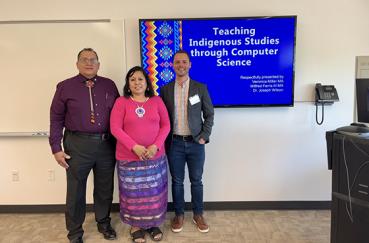Wind River Elementary Computer Science Collaborative

One way to approach broadening participation in computing is to create computer science (CS) instruction that is culturally relevant and sustaining for students from groups that are underrepresented in computing, including Native American students.
The Wind River Elementary Computer Science Collaborative is team of teachers, professional development providers, and researchers working together to bring culturally relevant computer science education to Indigenous elementary school students who live on the Wind River Reservation in Wyoming. The project is designed as a researcher-practitioner partnership. AIR serves as the coordinator of the RPP and the research partner. The Wyoming Department of Education and three school districts on the Wind River Reservation are the practitioner partners. BootUp Professional Development are our professional development providers.
Developing the Wind River Project
Thank you for all that you’ve done for us. I love your positive attitudes and knowledge and support to make technology more culturally relevant for our students here on the Wind River Reservation.
– Teacher participant
At the beginning of the project, the project team conducted strengths-based assessments with school and community stakeholders, including elders from the Eastern Shoshone and Northern Arapaho, the two tribal nations who live on the Wind River Reservation.
After developing a shared understanding of the cultural resources and concerns of the community, BootUp Professional Development, with support from the project team, created a series of computer science coding projects that showcase the Indigenous histories, languages, and cultures of the two tribes.
BootUp also facilitated professional development workshops to support teachers from the three school districts to implement the coding projects in their classrooms. AIR conducted professional learning community sessions to explore how teachers implemented the coding projects and to support continuous improvement of the curriculum, professional development, and ongoing supports.
Findings and Next Steps
This work has revealed several important findings that will guide our work going forward. For example, the project has highlighted the importance of teacher collaboration in development and implementation of lesson plans. Teachers often reported working together; for example, a teacher with knowledge of an Indigenous language might work with a teacher with more computer science experience to create and support students to complete an integrated project.
Teachers also have reported that in addition to students learning more about Indigenous history, language, and culture and computer science, they are also developing confidence and presentation skills. Students are proud of their work and eager to share it with others. One district had students present their coding projects to the school board.
